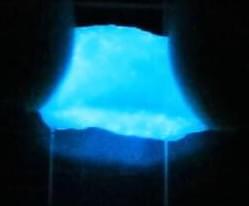“An exciting feature of these materials is their inherent simplicity—they need no electronics, no external power source,” said study senior author Shengqiang Cai, a professor of mechanical and aerospace engineering at the UC San Diego Jacobs School of Engineering. “We demonstrate how we can harness the power of nature to directly convert mechanical stimuli into light emission.”
Alginate, a polymer made from seaweed, was added to the dinoflagellates as the main components of the bioluminescent materials. These substances were combined to generate a solution, which was then processed by a 3D printer to produce an assortment of shapes.
During tests, the substances lit up when the scientists applied pressure and made patterns on their surface. The materials were so sensitive that even the weight of a foam ball moving across their surface caused them to glow.
